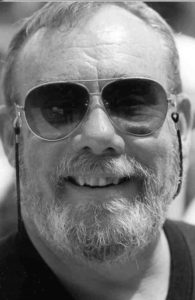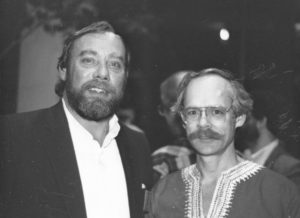Roger Schlobin and the IAFA: A Remembrance
C.W. Sullivan III

Roger Schlobin, ICFA 24, photo courtesy of FAU Library Special Collections, the Robert A. Collins Collection
In 1978, I attended and read a paper at the “International Symposium on Creatures of Legend” in Omaha, Nebraska. It was there that I saw, on a sheet of paper thumbtacked to a corkboard, the announcement of “The First International Conference on the Fantastic in the Arts,” Florida Atlantic University, Boca Raton. I went, and Roger Schlobin may well have been the first person I got to know there. Roger was already emerging as an important scholar, perceptive critic, and demanding editor in the field of fantasy literature. But as I think about Roger in these days since his passing, I am struck by how singularly important he was to ICFA and then IAFA (the conference came first and then the organization, oddly enough) and to many individuals in the group.
ICFA was fairly small in those days, and the regular returners were an even smaller group. Roger and I got to know each other initially through shared interests, especially medieval British literature (each of us had earned a PhD in that area) and fantasy literature. We also liked talking about cars, both of us “gear heads,” I suppose, and Roger’s progress with his Datsun 280Z (which he still had) or my adventures with my Mazda MX-6 (which I still have) were always important topics between us.
But Roger was also a social and intellectual force in the organization, introducing people with like interests to each other (Canadian scholar Nick Ruddick and myself, for example) and organizing groups to go out to dinner. Roger would get six or eight people together, and we would go somewhere he had picked (he had a good nose for restaurants) and sit around a big table and talk. Roger would preside, directing without dominating the conversation, and all of us would return to the hotel having had a great time. Throughout the years, even after his official duties were over, Roger would continue to be a social force.
Roger mentored or encouraged or pushed me into a more active role within the organization. I was on the original organizational committee for the IAFA and then moved up through the ranks to be a division head, vice president (with Don Palumbo as president), and president (with Nick Ruddick as vice president). I spent years on the Executive Board as a result of holding those offices and never forgave Roger for all the work I had to do. OK, I am kidding about that. Roger’s continuing interest in and concern for the health of the organization and the conference meant that he was always around—socializing, mentoring, encouraging, and influencing people he thought would be “good for the conference” and for the organization.
If Roger did not have the original idea for the Graduate Student Award, now the David G. Hartwell Emerging Scholar Award, he was its selection committee chairperson for a number of years and drew great pleasure from coming up to the podium at the banquet and announcing the graduate student winner. If he made more of a performance of the presentation of the award than some people liked, it was because he felt that the award was important and that its presentation was a serious event, honoring the future of scholarship, the future of the organization.
I do not know how many ideas for ICFA/IAFA came from Roger in discussions with Bob Collins, Tim Sullivan, and Donald Morse, but Roger’s one year as president may be the role for which he should be most remembered. In 1984-1985, the IAFA went independent from previously sponsoring organizations and moved the conference from Boca Raton, Florida, with some encouragement from Hap Henrikson, to Beaumont, Texas. As an independent academic organization and conference IAFA/ICFA was dependent for its success on membership dues and conference registrations, the latter being funds that would not be fully available until after the conference. Roger, as President, and the redoubtable Donald Morse, as Hotel Liaison, guaranteed to the conference hotel that they would be personally and financially responsible if not enough guests showed up to cover the expenses of the conference rooms, the conference meals, and the conference banquet. The discussions between Roger and Donald about how to hold a respectable conference as cheaply as possible are the stuff of legend. I kidded Roger and Donald over the years about risking “Their Lives, their Fortunes, and their Sacred Honors” (as we read in medieval narratives) for IAFA and ICFA, but that bit of humor was not far from the truth. If not for Roger and Donald, who more than stepped up at that crucial moment, we might not be approaching the 40th meeting of the ICFA in 2019.

Roger Schlobin and Donald Morse, ICFA 6, 1985, photo courtesy of FAU Library Special Collections, the Robert A. Collins Collection
Roger was absent from the last few years of the conference, and I am sorry for that. I have a feeling that he had begun to feel out of the loop, that he no longer mattered to the conference and the organization. If so, that was everyone’s fault and no one’s fault; an organization moves on, and running IAFA and putting on ICFA year after year is a full-time job for the Executive Board. Some years ago, when all the former presidents save Jules Zanger and Marshall Tymn could be or were going to be at the conference, I proposed that their oral histories be recorded. The proposal was rejected, and although there are some archives, we, as an organization, have lost much important information as we have since lost Bob Collins, Mike Levy, and Roger Schlobin.
I retired from East Carolina University in 2011 and had seen Roger only on occasional visits to Greenville since then. We had planned to have some kind of 75th birthday blowout in 2019 (he was two weeks younger than I, both of us June 1944 babies—and I never let him forget that), but, sadly, that celebration will not now happen. As John Donne wrote, “Any man’s death diminishes me,” and I think that Roger Schlobin’s death diminishes us all, especially the “us” that is the IAFA and the ICFA. Let us remember him.

The presentation of the first Collins award to Bob Collins by Roger Schlobin as IAFA President, ICFA 6, 1985, photo courtesy of FAU Library Special Collections, the Robert A. Collins Collection